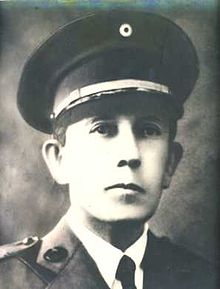Salvador Castaneda Castro
| Salvador Castaneda Castro | |
|---|---|
 |
|
| President of El Salvador | |
|
In office 1 March 1945 – 14 December 1948 |
|
| Preceded by | Osmín Aguirre |
| Succeeded by | Revolutionary Council |
| Personal details | |
| Born | 6 August 1888 Chalchuapa , El Salvador |
| Died | March 5, 1965 (aged 76) San Salvador , El Salvador |
| Occupation | General |
General Salvador Castaneda Castro (6 August 1888 - 5 March 1965) was President of El Salvador from 1 March 1945 to 14 December 1948. He had previously served as Interior Minister under President Maximiliano Hernández Martínez. He was elected unopposed during martial law in January 1945, and was overthrown in a coup by other military officers in December 1948.
A general strike had begun on 19 April 1944 in reaction to the repressive policies of the President Maximiliano Hernández Martínez, which included acts of civil disobedience by workers, students, and government employees, who refused to attend work or school during the strike. During the strike a member of the police killed the son of a wealthy United States immigrant. The US ambassador demanded an explanation, and the struggling economy also contributed to the pressure on Martínez, who resigned. Before leaving for exile, Martínez appointed General Andrés Ignacio Menéndez as provisional president. Although the strike succeeded in ousting Martínez, its leaders were not organized well enough to form an enduring organization. Martínez' supporters also succeeded in arresting or exiling many of the leaders of the strike.
In October 1944, Osmín Aguirre y Salinas, who had been the director of the National Police, staged a counter-coup along with many other very conservative military officials. He promptly repressed most dissident groups. This repression radicalized the oppression, which armed itself in neighboring Guatemala, which had just overthrown its dictator Jorge Ubico during the October Revolution. An armed uprising was launched by students in San Salvador on 8 December, followed by an insurgent attack from Guatemala four days later. Both movements were crushed by the Aguirre government, which thus consolidated its position in power.
In early 1945, Aguirre transferred power to Castaneda Castro. In January 1945 Castro was elected president, with the backing of the elites that had supported Martínez. He contested the election as a candidate of Partido Agraria, or the Agrarian Party. He faced no opposition in the election, and the country remained under martial law during the entire process. Castro had previously served as the interior minister in the government of Martínez, as had many of the ministers that Castro appointed.
...
Wikipedia
